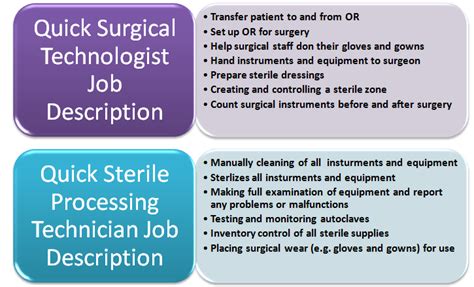In the medical field, there are various roles that play a crucial part in ensuring patient safety and successful surgical outcomes. Two of these roles are Sterile Processing Technicians (SPTs) and Surgical Technicians (STs). While both professions are essential in the healthcare industry, they have distinct responsibilities, requirements, and work environments. In this article, we will delve into the key differences between Sterile Processing Techs and Surgical Techs, providing you with a comprehensive understanding of these two vital professions.
The Importance of Sterile Processing and Surgical Technicians
Before we dive into the differences, it's essential to acknowledge the significance of both roles. Sterile Processing Technicians and Surgical Technicians work behind the scenes to ensure that medical instruments and equipment are properly sterilized and prepared for use in surgical procedures. Their attention to detail, technical skills, and ability to work under pressure are vital in maintaining patient safety and preventing surgical site infections.
Sterile Processing Technicians (SPTs)
Sterile Processing Technicians are responsible for the decontamination, sterilization, and preparation of medical instruments and equipment. Their primary goal is to ensure that all equipment is properly cleaned, disinfected, and sterilized to prevent the spread of infections.
Key Responsibilities of Sterile Processing Technicians
- Decontaminate and sterilize medical instruments and equipment
- Inspect and assemble instruments and equipment for use in surgical procedures
- Maintain accurate records of sterilization and inventory
- Collaborate with surgical teams to ensure timely delivery of sterilized equipment
- Monitor and maintain sterilization equipment

Surgical Technicians (STs)
Surgical Technicians, also known as Operating Room Technicians, assist surgeons and other medical professionals during surgical procedures. Their primary responsibility is to ensure that the operating room is prepared and equipped with the necessary instruments and equipment.
Key Responsibilities of Surgical Technicians
- Prepare the operating room for surgical procedures
- Assist surgeons and other medical professionals during procedures
- Maintain asepsis and prevent infection
- Handle and care for surgical instruments and equipment
- Monitor patient vital signs and report any concerns to the surgical team

Key Differences between Sterile Processing Techs and Surgical Techs
While both professions are crucial in the healthcare industry, there are distinct differences between Sterile Processing Technicians and Surgical Technicians.
- Work Environment: Sterile Processing Technicians typically work in a sterile processing department or central supply area, while Surgical Technicians work in the operating room.
- Responsibilities: Sterile Processing Technicians focus on the decontamination, sterilization, and preparation of medical instruments and equipment, while Surgical Technicians assist surgeons and other medical professionals during surgical procedures.
- Education and Training: Both professions require specialized education and training, but Sterile Processing Technicians typically require a post-secondary certificate or associate's degree, while Surgical Technicians may require a post-secondary certificate, associate's degree, or bachelor's degree.
- Certification: Both professions offer certification options, but Sterile Processing Technicians can obtain certification through the International Association of Healthcare Central Service Materiel Management (IAHCSMM), while Surgical Technicians can obtain certification through the National Board of Surgical Technology and Surgical Assisting (NBSTSA).
Career Outlook and Salary
Both Sterile Processing Technicians and Surgical Technicians are in high demand, with the Bureau of Labor Statistics (BLS) predicting employment growth of 10% for Surgical Technologists and 14% for Medical Equipment Preparers (including Sterile Processing Technicians) from 2020 to 2030.
In terms of salary, Sterile Processing Technicians can expect to earn a median annual salary of around $44,000, while Surgical Technicians can expect to earn a median annual salary of around $51,000.
Conclusion
In conclusion, while both Sterile Processing Technicians and Surgical Technicians play critical roles in the healthcare industry, they have distinct responsibilities, requirements, and work environments. By understanding the key differences between these two professions, you can make informed decisions about your career path and pursue a rewarding career in the medical field.
Gallery of Surgical and Sterile Processing Images






FAQs
What is the difference between a Sterile Processing Technician and a Surgical Technician?
+Sterile Processing Technicians are responsible for the decontamination, sterilization, and preparation of medical instruments and equipment, while Surgical Technicians assist surgeons and other medical professionals during surgical procedures.
What education and training do Sterile Processing Technicians and Surgical Technicians require?
+Sterile Processing Technicians typically require a post-secondary certificate or associate's degree, while Surgical Technicians may require a post-secondary certificate, associate's degree, or bachelor's degree.
What is the career outlook for Sterile Processing Technicians and Surgical Technicians?
+The Bureau of Labor Statistics (BLS) predicts employment growth of 10% for Surgical Technologists and 14% for Medical Equipment Preparers (including Sterile Processing Technicians) from 2020 to 2030.
